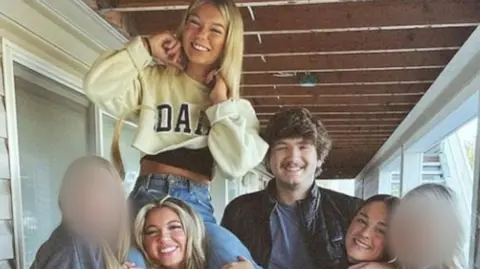A 30-year-old man has admitted to murdering four roommates in a small Idaho college town in 2022, as part of a plea deal to avoid the death penalty.
Bryan Kohberger, a former PhD criminology student, was set to stand trial in August over the attacks that shocked America.
During a hearing on Wednesday, Judge Steven Hippler read the details of the agreement, including that Kohberger waived his right to appeal or seek leniency.
Kaylee Goncalves, Ethan Chapin, Xana Kernodle and Madison Mogen were killed in their off-campus home in the city of Moscow, in November 2022. The two others in the house, Bethany Funke and Dylan Mortensen, survived.
“Are you pleading guilty because you are guilty?” Judge Hippler asked the defendant.
“Yes,” Kohberger replied.
Kohberger had previously pleaded not guilty.
Before beginning proceedings, the judge stated that his office had received numerous messages and voicemails from members of the public that sought to “influence my decision making”.
He said he had not read or listened to any of the messages, and urged people to stop sending them.
 Instagram
InstagramThe judge then read out the charges against Kohberger – one count of burglary, which carries a maximum sentence of 10 years in prison, and four counts of first-degree murder, which each carry a maximum sentence of life in prison.
Kohberger pleaded guilty to all the charges.
Judge Hippler said he will formally be sentenced on 23 July. It’s expected he will spend the rest of his life behind bars.
The plea deal means lingering questions that may have been explored during a trial, such as Kohberger’s motives, remain unanswered.
During the hearing, prosecuting attorney Bill Thompson told the court Kohberger had planned the attack, buying the knife online around eight months before the murders.
The blade’s sheath was recovered, but the weapon itself was never found.
The prosecutor said there was no evidence of a “sexual component” to the killings.
 Instagram
Instagram‘Deal with the devil’
Some in court appeared to become emotional as the names of the victims were read out. Kohberger remained impassive, including when he admitted to killing the four victims.
The brutal nature of the murders, the age of the victims and the suspect’s background in criminology sparked intense public interest in the case.
The plea deal has divided the families of the victims.
Outside court, the father of Kaylee Goncalves, Steve, said he felt “pretty let down”.
He said the state “made a deal with the devil”.
The family wanted a full confession, including details about the location of the murder weapon and confirmation the defendant acted alone.
However, Madison Mogen’s mother and stepfather said outside court they supported the plea agreement.
In a statement read out by their lawyer they expressed gratitude to everyone who had supported them and for the “successful outcome”.
“We support the plea agreement 100%,” the attorney read. “We turn from tragedy and mourning… to the light of the future. We have closure.”
Kohberger, who was a student at nearby Washington State University, was charged in January 2023.
It’s not believed he knew the victims personally.
The defendant was arrested at his Pennsylvania family home weeks following the stabbings, after investigators said they found DNA evidence on a “leather knife sheath” at the crime scene. He was indicted by a grand jury in May 2023.
Court documents revealed police recovered a knife, a Glock pistol, black gloves, a black hat and a black face mask during a search of Kohberger’s family home.
His defence team questioned the accuracy of the DNA evidence and succeeded in its bid to move the trial location, after arguing their client would not receive a fair hearing from local jurors.
But they had failed to remove the death penalty as a sentencing option, after citing an autism diagnosis for Kohberger.
Idaho is one of 27 US states that allows for capital punishment, but there have been no executions since 2012, according to a database by the Death Penalty Information Center.
